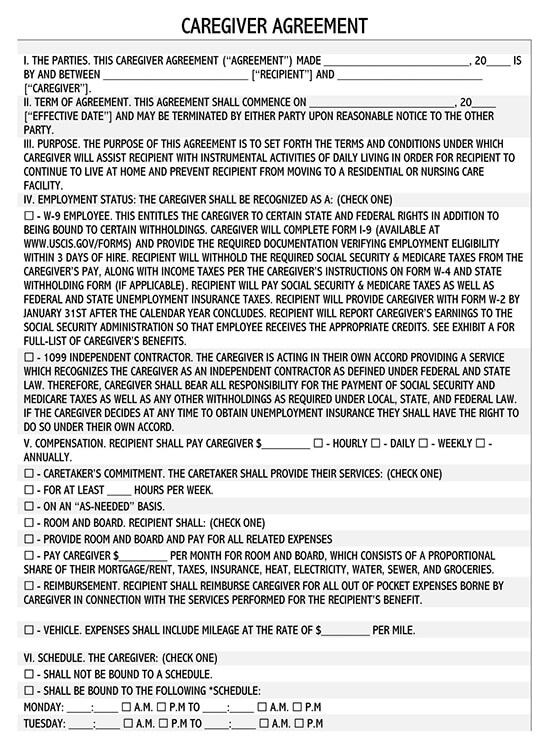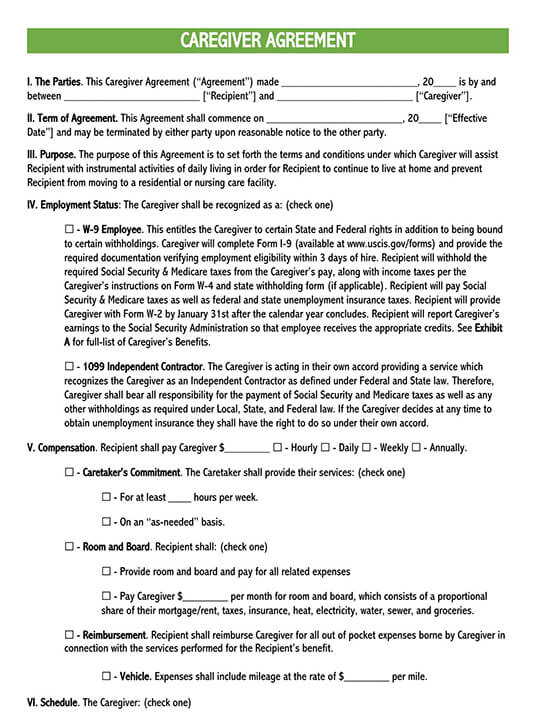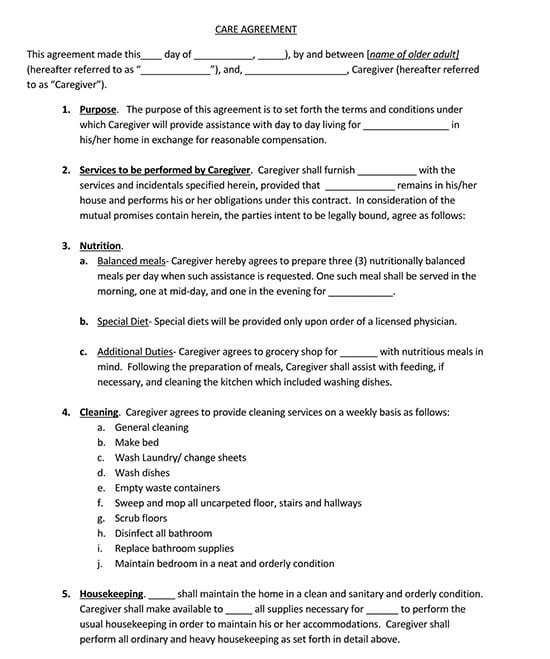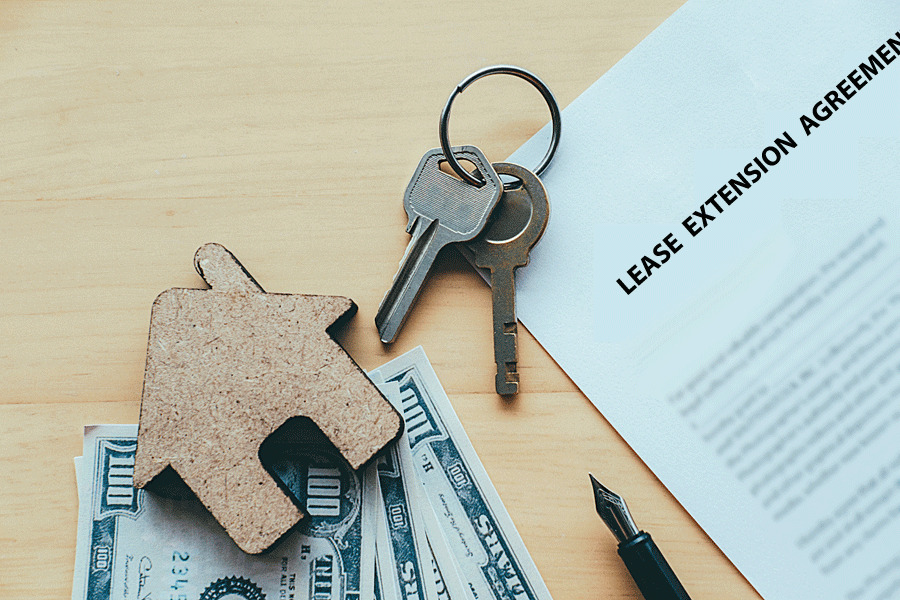Life can sometimes present various challenges hindering us from taking our responsibilities in one way or the other. For instance, a family member may need more help than just occasional assistance either because they are too old or too young to care for themselves. Also, sometimes a person may get mental disorders hence incapacitating him or her from fulfilling their day to day duties. For these and many more reasons, a family may opt to seek for the help services from a caregiver. However, before hiring a caregiver, you will need to sign a caregiver agreement to officiate your engagements.
Free Templates & Examples



Defining a Caretaker Agreement
Basically, a Caretaker Agreement refers to an agreement between a client and a caregiver to provide care services either at a fee or free. The client here refers to the family who needs the services. On the other hand, a caregiver can either be a family member, a close friend, a nurse, or any other professional service delivery.
Oftentimes, a caregiver is charged with various responsibilities such as attending to the sick, the elderly, providing balances diets, housekeeping duties, and other personal care needs, to mention a few. The main purpose of getting into such agreements is to avoid future conflicts over personal care. If both the client and the caregiver put down their expectations and responsibilities in writing, it helps both parties stay on good terms for a long.
How to Create an Effective Caretaker Agreement
Creating a Caretaker Agreement can sometimes pose a challenge to most families. However, when guided by the following tips, it becomes a lot easier:
Discuss the matter
First and foremost, you need to discuss the subject matter with the whole family. Make sure everybody in the family is for the move. Since this is a sensitive topic, strong feelings, or even arguments may occur.
In your discussions, make sure you touch on the following ideas:
- The day the caregiving services will start and end
- The cost of the services; anybody who is available and willing to help in any way
- Where the loved one (the elderly or the sickling) will stay
Consider having a mediator
Just in case you find some family members going against the idea, you can bring a mediator on board. Having an unbiased mediator helps avoid other family issues such as jealousy, favoritism, competitiveness, among others. Mediators also help save energy and time hence bringing the families to the same table.
Consider having an accountant
Anybody willing to get into a caregiver agreement must consider putting their finances and tax situations together. When taking care of the elderly, or anybody with a special need, finance is often a major factor. Therefore, you can consult an accountant and see what recommendations you have. Their advice will help you make rational decisions that won’t harm your financial stability.
Make your decisions
With the advice from the family, the mediator, and the accountant, you’ll always be in a better position to meet the specific needs of your elderly/sickling. Since you know what is expected, you can now meet with the caregiver and negotiate on the agreement.
Some of the items you’ll discuss include the following:
- Benefits: Here, you’ll discuss with the caregiver on various benefits associated with their services rendered. This can be health insurance costs, paid leaves, and sick days and vacations.
- Compensation: Like any other job, money will always play a key role in motivation. Therefore, discuss the mode and amount of compensation. It can be in hours, weekly or monthly basis. Regardless of the period of pay, ensure you comply with the Medicare regulations.
- Dates: Under this section, you will indicate the dates where the agreement will take effect, and the day it will end. Again, you can define the number of hours the primary caregiver will be available in a week.
- Expenses: As the caregiver will be rendering out his/her duties, there will be other expenses that will accrue. Be sure you discuss them as well.
- Duties: While the term caregiving is so general, there are specific roles you would want the person to do. Therefore, pay attention to activities of daily living that are common for an elderly or someone with special needs. Make sure you define roles in a clear and transparent manner. At the same time, you can mention what happens at the time of emergency. Let’s say which family member will assist the primary caregiver in terms of emergencies.
- Signatures: At the end of the document, both the parties should append their signatures so as to make it binding.
Frequently Asked Questions
No. you don’t necessarily need a lawyer when getting into caregiver agreements. However, it’s recommended that before one gets into any kind of contractual relationship, a lawyer should witness the engagement.
Medicaid is usually a federal program that compensates individuals with limited income or assets. When applying for Medicaid, an individual can use his/her Caretaker Agreement to act as proof of their limited income or care needs. However, since the regulations differ from one state to the other, you may want to check the specific state in which you live.
A caregiver agreement often has three common requirements. These include:
• A Caretaker Agreement should be in written form
• Payments should be for future services and not the already performed
• The compensation should be reasonable
Final Thought
Are you looking for a caregiver to offer your loved one primary care services? If so, then we might be of great help to you. We have professionally crafted Caretaker Agreement templates to help ease the whole process for you. The templates contain basic things needed when coming into agreement. Better yet, the templates are customization to allow you to get your specifics right. All you need to do is to download the free templates and get going.












